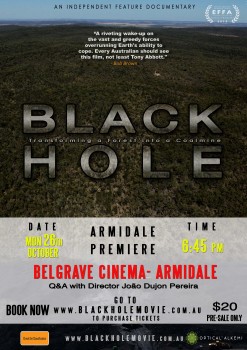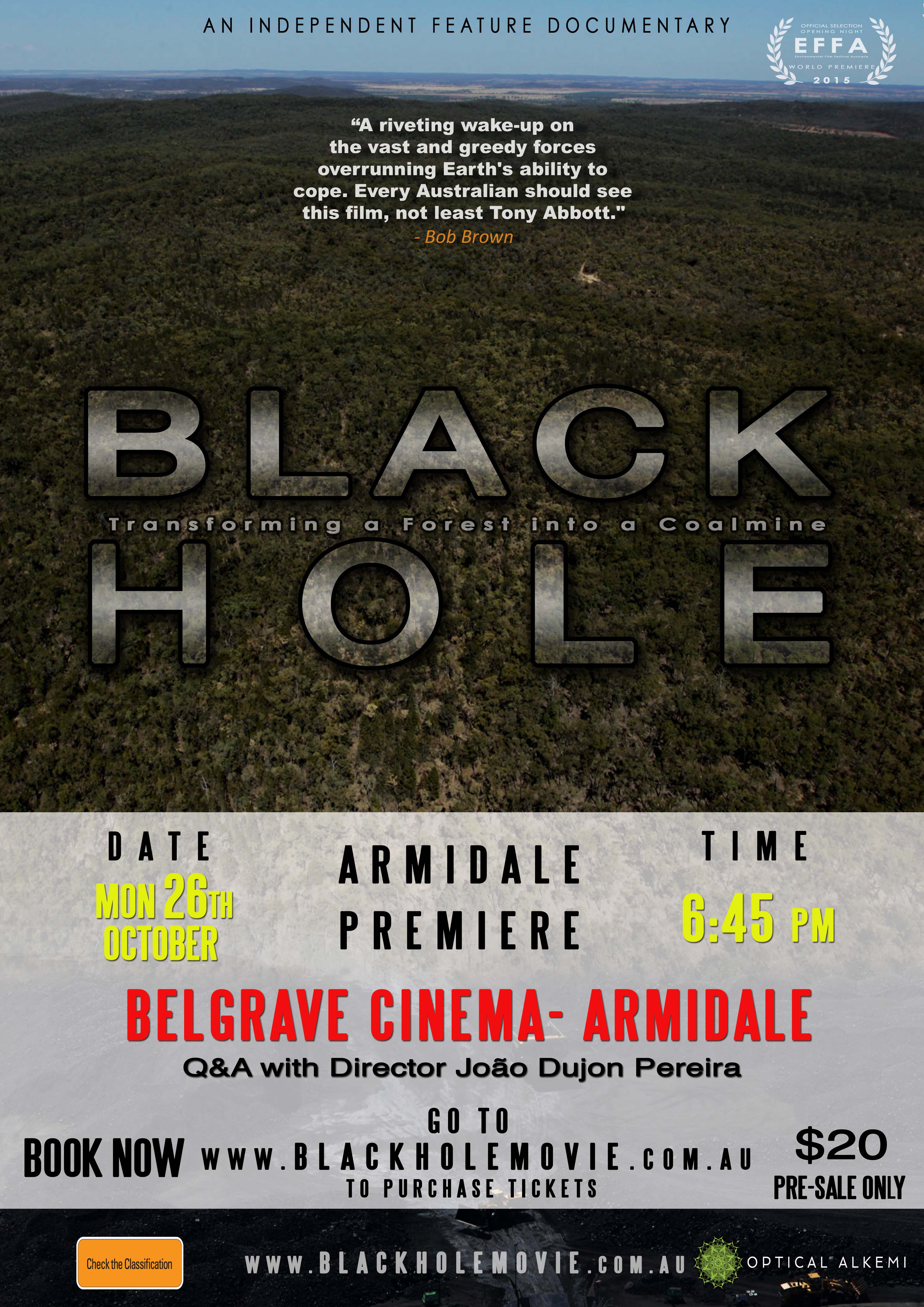 October 26 – Belgrave Cinema Armidale – 6:45pm
October 26 – Belgrave Cinema Armidale – 6:45pm
Tickets $20 include Q&A with the filmmaker and are presale only!
A new film reveals unseen footage of coal, corruption and community resistance of one of Australia’s most controversial mining projects – Whitehaven’s Maules Creek Coal Mine in the Leard State Forest.
In light of Adani and Shenhua approvals and the government’s move to strip communities of the right to challenge government decisions, the film is especially pertinent.
Set against the backdrop of the mining industry’s ever-increasing thirst for fossil fuels, Black Hole is an intense and riveting exposé. Revealing unseen footage of the Maules Creek coal mine blockade, police misconduct, corporate spies and the destruction of sacred Indigenous burial sites, Black Hole brings to life the power imbalance between big corporations and communities.
“This is far more than just a campaign to stop a coal mine, this is ground zero for empowerment of citizens who have become disenchanted with a system that is portrayed as a democracy.” João Dujon Pereira – Producer/Director
“Black Hole is a riveting wake-up on the vast and greedy forces overrunning Earth’s ability to cope. Every Australian should see this film, not least Tony Abbott.” Bob Brown – The Bob Brown Foundation
facebook | www.blackholemovie.com.au
Black Hole is a fully independent production, funded partially through crowdfunding and the remainder through substantial personal investment by the filmmaker. There was no funding from NGOs, Government or Corporations for the making of this film.

If one looks at the 2014 Annual Report for Whitehaven Coal, one can see a number of things. Note: This Annual Report is the most recent one, released 12 September 2014. Annual Reports are the main mandatory reporting document required for most companies. The 2014 Annual Report for Whitehaven Coal is accessible here:
http://www.whitehavennews.com.au/wp-content/uploads/2015/01/12-Sep-2014-2014-Annual-Report.pdf
On pages 191 and 193 of the Annual Report, the most significant shareholders are disclosed. By and large, these are multinational financial institutions. This is one of the items which frustrated me while I was working in financial services. Members of the general public are too small i.e. financially to influence the major institutional shareholders. Without being able to influence the major institutional shareholders, one is unable to influence the operations of companies such as Whitehaven Coal. Yet, it is members of the general public that are most impacted by corporate operations.
If one turns back to page 5 of the 2014 Annual Report and one looks under the heading ‘Customers’, the following sole paragraph appears:
“Whitehaven Coal’s customer base
comprises major world steel producers and
a number of electricity power companies
with several located in Japan, Korea,
Taiwan, India and China. For more
information see page 29”
If one goes to page 29 of the Annual Report, the key markets that are mentioned are Korea, Japan, India and Asia generally. Australia is not mentioned at all. I am not patriotic by any stretch of the imagination but when a 99% of corporation’s central, daily, operations impact on one locality and the beneficiaries of those operations are on entirely different landmasses, surely something is amiss.
What is amiss is that the corporate form (it is only via the law that they come into existence) has no built-in checks or balances. They simply go and on an inexorable path of extractions, processing and sales. That is what underpins their very existence. It has been going on since the turn of the 20th Century (at the latest) and has been accelerating since the end of World War II.
In all this, we – collectively that is – have misplaced our sanity. Corporations are a product of human design. In the 1600s, they were wound up as soon as a project e.g. building of a bridge was completed. In 1720, because too many people were getting scammed, the British Parliament banned them out of existence. They resurfaced in the latter half of the 1800s in the United States of America. Why? To bring in machinery. And the courts in the United States of America then said (in Santa Clara (1886)) that directors could not be sued for the actions of the corporation. Australia followed suit in 1897 with Salomon vs Salomon & Co. So too did the rest of the world. Why? To bring in investors among competing jurisdictions.
So much for the eco (which translates to ‘house’) in economics (‘management of one’s house’). Where, in today’s world do you see ecology (‘knowledge of one’s house’) preceding ‘economy’? This is where the entire thing has gone wrong. Today’s capitalism is nothing more than a con job. A mighty successful con job but a con job nonetheless.
Best regards,
Tom Livanos.
tom.369@hotmail.com
Armidale, New South Wales.
Friday 18 September 2015.